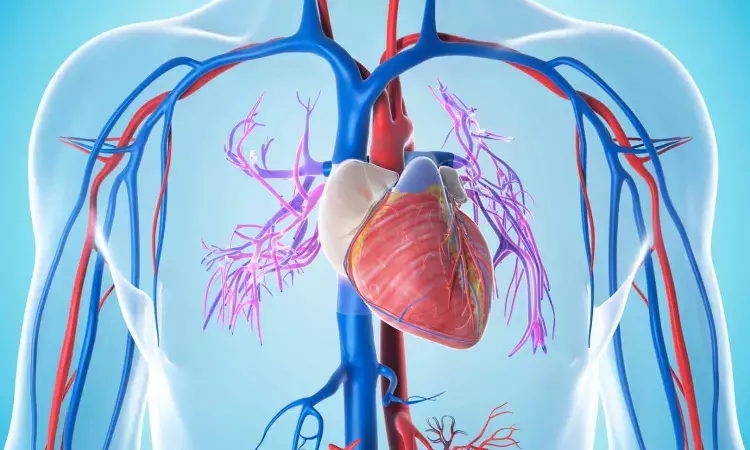- Home
- Medical news & Guidelines
- Anesthesiology
- Cardiology and CTVS
- Critical Care
- Dentistry
- Dermatology
- Diabetes and Endocrinology
- ENT
- Gastroenterology
- Medicine
- Nephrology
- Neurology
- Obstretics-Gynaecology
- Oncology
- Ophthalmology
- Orthopaedics
- Pediatrics-Neonatology
- Psychiatry
- Pulmonology
- Radiology
- Surgery
- Urology
- Laboratory Medicine
- Diet
- Nursing
- Paramedical
- Physiotherapy
- Health news
- Fact Check
- Bone Health Fact Check
- Brain Health Fact Check
- Cancer Related Fact Check
- Child Care Fact Check
- Dental and oral health fact check
- Diabetes and metabolic health fact check
- Diet and Nutrition Fact Check
- Eye and ENT Care Fact Check
- Fitness fact check
- Gut health fact check
- Heart health fact check
- Kidney health fact check
- Medical education fact check
- Men's health fact check
- Respiratory fact check
- Skin and hair care fact check
- Vaccine and Immunization fact check
- Women's health fact check
- AYUSH
- State News
- Andaman and Nicobar Islands
- Andhra Pradesh
- Arunachal Pradesh
- Assam
- Bihar
- Chandigarh
- Chattisgarh
- Dadra and Nagar Haveli
- Daman and Diu
- Delhi
- Goa
- Gujarat
- Haryana
- Himachal Pradesh
- Jammu & Kashmir
- Jharkhand
- Karnataka
- Kerala
- Ladakh
- Lakshadweep
- Madhya Pradesh
- Maharashtra
- Manipur
- Meghalaya
- Mizoram
- Nagaland
- Odisha
- Puducherry
- Punjab
- Rajasthan
- Sikkim
- Tamil Nadu
- Telangana
- Tripura
- Uttar Pradesh
- Uttrakhand
- West Bengal
- Medical Education
- Industry
Vaccination as a new form of cardiovascular prevention: an ESC Clinical Consensus Statement

A new ESC Clinical Consensus Statement published in the European Heart Journal discusses the key role of vaccination in preventing cardiovascular events following various viral and bacterial infections.
“We have known for many years that influenza can increase the risk of major adverse cardiovascular events such as heart attacks and can exacerbate heart failure,” said Professor Thomas F. Lüscher, ESC President and senior author of the ESC Clinical Consensus Statement. “More recently, evidence suggests that other respiratory infections are also associated with increased cardiovascular morbidity and mortality. The new publication describes how vaccinations not only prevent infections but also reduce the risk of cardiovascular events, particularly in susceptible individuals.”
The ESC Clinical Consensus Statement describes data on the risk of cardiovascular complications following infections such as pneumococcal pneumonia, influenza, SARS-CoV-2 and respiratory syncytial virus, among others, and describes the inflammatory mechanisms that may be responsible. Evidence is then summarised for the beneficial effects of vaccines in reducing cardiovascular events following various viral and bacterial infections, particularly in at-risk patient groups. Clinical practice guidelines from the ESC and from the American College of Cardiology (ACC)/American Heart Association (AHA) are presented, which advocate for vaccination against influenza and other widespread infections in patients with chronic coronary syndromes (including coronary artery disease) and in those with heart failure.
Serious adverse reactions to vaccinations are very rare. The consensus statement also discusses the risks of cardiovascular adverse events after vaccination, such as myocarditis, and describes appropriate management strategies. Then follows advice on which vaccines should be given to patients with cardiovascular diseases and how often. Vaccination of pregnant women and other vulnerable patient groups, such as those with congenital heart disease and heart transplantation, is considered.
Professor Lüscher concluded: “Prevention is crucial for reducing the considerable burden of cardiovascular disease. The totality of the evidence indicates that vaccinations should become a foundational pillar of preventive strategies alongside other established measures.”
Reference:
Heidecker B, Libby P, Vassiliou VS, et al. Vaccination as a new form of cardiovascular prevention: an ESC Clinical Consensus Statement. Eur Heart J. 2025. doi: 10.1093/eurheartj/ehaf384.
Dr Prem Aggarwal, (MD Medicine, DNB Medicine, DNB Cardiology) is a Cardiologist by profession and also the Co-founder and Chairman of Medical Dialogues. He focuses on news and perspectives about cardiology, and medicine related developments at Medical Dialogues. He can be reached out at drprem@medicaldialogues.in


